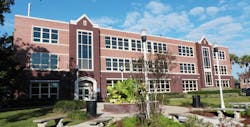Florida State University closes building after reports of black mold and radon
Florida State University has closed the Sandels building on the Tallahassee campus for air testing after a report by faculty members listed "serious health concerns," including harmful air quality, possible chemical exposure and "extremely high and unsafe" levels of radon and black mold.
The Tallahassee Democrat reports that the faculty members also called attention to five faculty members and three former graduate students who have worked extensively in the building and were diagnosed with cancer in the last decade. Three of them have died.
The university says it is conducting a "thorough environmental review of the building" that will include comprehensive radon level measurements, one of the main concerns laid out in the report.
Florida State also is examining conditions in the Williams Building, which houses the English department, after air quality concerns were received by the university, according to spokeswoman Amy Farnum-Patronis.
Instructors who work in the Williams building, which remains open, have been given the option to temporarily work remotely. Some professors have begun to move classes online.
The 129-page report on the Sandels building was created by four professors who compiled emails, maps, photos, public records and testimonies from faculty and families.
It included a myriad of complaints, warnings and efforts from faculty and staff to notify the university of the building's problems dating back to the early 2000s.
The most common complaint in written documents since 2001 concern black particles coming out of the ventilation system and building up on office desks, lab benches and classroom furnishings.
In 2009, after a surge of black particle reports, an air quality evaluation was carried out. It yielded findings of high levels of black mold as well as "high levels of non-viable material in the HVAC coils."
About the Author
Mike Kennedy
Senior Editor
Mike Kennedy, senior editor, has written for AS&U on a wide range of educational issues since 1999.
